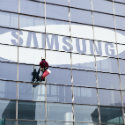
Plucky Samsung, a giant in the electronics industry but a relative lightweight in the mobile telecom infrastructure market, has taken up Huawei's habit of citing how many 5G basestations it has shipped, and the figures from its domestic market do not look good for any of its 5G rivals.
In a press release sent out this week, Samsung claims to account for as many as 53,000 of the 5G basestations that have been shipped to South Korea's three mobile network operators -- KT Corp, SK Telecom and LG Uplus. That makes it the leading 5G network vendor in the country, Samsung boasted.
It is hardly a surprise that Samsung has done well in its own backyard. If it could not mount a decent challenge there, it would probably stand little hope in some other parts of the world. But its numbers point to a huge lead over any equipment rival on South Korean soil. Amid all the current 5G hype, they also suggest something else -- that not very many 5G basestations have been shipped worldwide.
Samsung's shipments number in the South Korean market alone exceeds Huawei's global total by 3,000. Only 10,000 of Huawei's are in South Korea, though, where they feature in the network of LG Uplus, the smallest of the country's three mobile operators. The others are split across various other markets -- with Huawei currently boasting around 30 5G deals internationally -- but most of them are in China and the UK, Light Reading believes.
So where does this leave Ericsson and Nokia, Europe's two old-age vendors? Unfortunately, neither one of them discloses details of 5G basestation shipments, prompting speculation they have not sold as many as Huawei (if they had, they would shout about it, right?). But unlike Huawei, each has a prominent role in the 5G plans of the main US operators, which some industry observers (although certainly not all) regard as 5G pioneers.
Nevertheless, in South Korea, the data does not look encouraging for Ericsson and Nokia. Before Samsung's update this week, it was known that both KT Corp and SK Telecom had chosen Ericsson, Nokia and Samsung as 5G partners, and that LG Uplus had gone mainly with Huawei. A mixture of South Korean press reports and press statements from the telcos also indicated that KT Corp had deployed 30,000 5G basestations, SK Telecom about 34,000 and LG Uplus just the 10,000 made by Huawei.
The country total in early April, then, was about 74,000. If Samsung accounts for 53,000 of those, and Huawei for another 10,000, then just 11,000 came from the Nordic suppliers. Perhaps there is a good reason Ericsson and Nokia have nothing to say about basestation shipments.
You're invited to attend Light Reading's Big 5G Event! Formerly the Big Communications Event and 5G North America, Big 5G is where telecom's brightest minds deliver the critical insight needed to piece together the 5G puzzle. We'll see you May 6-8 in Denver -- communications service providers get in free!
Does any of this really matter in the long run? Possibly. There are clearly some bragging rights at stake in the first country to launch a commercial 5G service for the mass market. More importantly, the world's other telcos will have trained a keen eye on South Korea to see what the early experiences are like on 5G production networks. Greater involvement in those services -- assuming their technology measures up -- could help Ericsson and Nokia persuade telcos in other regions to go Nordic.
Samsung is obviously making the most of its market-leading situation, telling everyone that its 5G expertise is the reason it has been able to put up so many basestations so quickly. Its boxes, it insists, are "among the smallest and lightest in the industry, ensuring they can be easily installed in existing operators' cellular sites, requiring minimal changes."
"This ability to re-use existing sites has been key to enabling the Korean operators to deploy a 5G network consisting of tens of thousands of radios within just a few months since the December 1 launch," it adds.
In other words, if you want to get a high-performance 5G network up in record time, forget about the Swedes, the Finns and the Chinese -- and come to Samsung.
Related posts:
— Iain Morris, International Editor, Light Reading
About the Author(s)
You May Also Like











